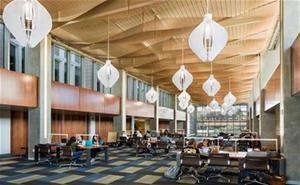Career Development
The UCSB Library is seeking proposals for their annual Open Access Week programs. It is an opportunity for students and faculty to tell the Library what specific actions they would like the Library to take to redirect some collection funds toward more sustainable publishing models and initiatives. Submission deadline is August 1, 2018.

UCSB's Library is seeking proposals for their annual Open Access Week programs. Proposals are accepted from members of the UCSB community. It is an opportunity for students and faculty to tell the Library what specific actions they would like the Library to take to redirect some collection funds toward more sustainable publishing models and initiatives. Submission deadline is August 1, 2018.
Click here to complete âyour submission.
The library welcomes a variety of program types and formats that illustrate (literally and figuratively):
(1) The opportunities, challenges, prevalence, and impact of one or more strategies to a given approach (e.g., green, gold, etc.) to Open Access (OA) referenced in the UC Libraries Pathways To Open Access toolkit
(2) The scholarly communication system of the future
(3) Potential pathways to open access for UCSB Library
(4) Your open access priorities today
(5) The changing nature of scholarly communication and publishing
(6) What we can learn from countries where OA journals are the dominant norm, and costs are shared among members of the scholarly community for a lasting impact
(7) How to ensure OA sustainability models are not exclusionary, and that what counts as open scholarship does not perpetuate bias
Open access is critical for increasing access to the scholarly record for research and learning, and for promoting knowledge-sharing and the advancement of knowledge for the public good. The aim is to raise awareness of and to investigate the various approaches and strategies for advancing the transition to open access.
Other related themes may also include experimentations, challenges, collaborations, innovations, research, and practices concerning:
- Journal economics
- Publisher relations
- Open access journals and or publishers
- Open access books and or publishers
- Open access repositories (e.g., eScholarship, bioRxiv, SSRN, etc.)
- Scholar-led and owned open access (aka radical open access)
- Article publishing charges
- Book publishing charges
- Open access ETDs (electronic theses and dissertations)
- Open data
- Open peer review
- Open educational resources and textbook affordability
- Community controlled infrastructures - The Open Science Framework, Directory of Open Access Journals, arXiv.org and Sherpa/RoMEO
- Copyright and fair use
- Open access funds
- Author rights
- Discovery and visibility
- Funder mandates
- Research data management
Proposal âTypes
(1) Lecture (45 minutes)
(2) Roundtable discussion - group discussion session facilitated by 1-2 conveners (one hour)
(3) Panel presentation (45 minutes)
(4) Tutorial or hands-on workshops (1-2 hours)
(5) Creative works to display or perform. These could include but are not limited to the visual arts, animations (e.g. Open Access Explained), visualizations, spoken word, poetry, one-act- plays, monologues, reader's theater, songs, videos, film shorts, musical compositions, etc. with a Creative Commons license.
Timeline
June 1 - call for proposals distributed
August 1 - proposals due
August 10 - notifications go out
Questions can be directed to the organizing committee.